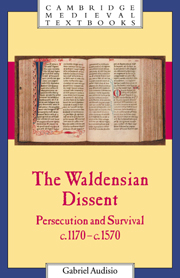Book contents
- Frontmatter
- Contents
- List of maps
- Preface
- Acknowledgements
- Introduction
- 1 1170 – 1215: decisive and purposive origins
- 2 The thirteenth century: the need to adapt
- 3 The fourteenth century: the challenge of believing differently
- 4 The fifteenth century: the risks of longevity
- 5 The constraints of a life in hiding
- 6 The need to organise
- 7 A culture of their own: the written and the spoken word
- 8 The sixteenth century: the end as a way forward?
- 9 Epilogue: the Waldensian Church
- Conclusion
- Bibilography
- Index
- Cambridge Medieval Textbooks
1 - 1170 – 1215: decisive and purposive origins
Published online by Cambridge University Press: 05 June 2012
- Frontmatter
- Contents
- List of maps
- Preface
- Acknowledgements
- Introduction
- 1 1170 – 1215: decisive and purposive origins
- 2 The thirteenth century: the need to adapt
- 3 The fourteenth century: the challenge of believing differently
- 4 The fifteenth century: the risks of longevity
- 5 The constraints of a life in hiding
- 6 The need to organise
- 7 A culture of their own: the written and the spoken word
- 8 The sixteenth century: the end as a way forward?
- 9 Epilogue: the Waldensian Church
- Conclusion
- Bibilography
- Index
- Cambridge Medieval Textbooks
Summary
LEGENDS
The early days of the Poor of Lyons, as is the case for many other movements, be they anti-establishment, minority, religious or otherwise, were so unassertive that they were hardly noticed at all. Later, faced with the movement's survival and endurance, partisans and antagonists vied imaginatively with each another – for the notion of historical precision was not an issue in the middle ages – in some cases admittedly with the best of intentions, to explain and thus describe the origins of this curious group.
For this reason, within the group from Lyons the myth grew up that their origins dated back to apostolic times, a belief that was to persist for centuries. To understand their reasoning, it must be borne in mind that the worst criticism that could be addressed to Christians appearing not fully to respect the faith or the moral doctrine of the Church was that of being innovatory. Like all revealed religions, Christianity is built around a canon to be conserved and a message to be transmitted. This was the role both of the ‘Tradition’ in the true sense of the term and also of the Roman hierarchy which had every intention of controlling the transmission of the message and, as doctrinal authority, supervising its authenticity. They reasoned that God had spoken once and for all through his son Jesus Christ and that his Word addressed to mankind was entirely contained in the bible.
- Type
- Chapter
- Information
- The Waldensian DissentPersecution and Survival, c.1170–c.1570, pp. 6 - 25Publisher: Cambridge University PressPrint publication year: 1999



